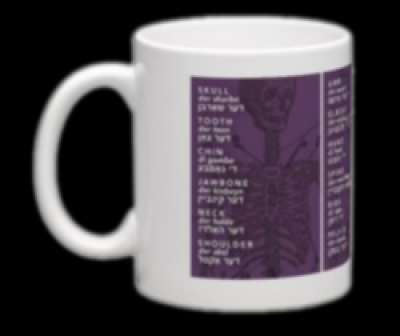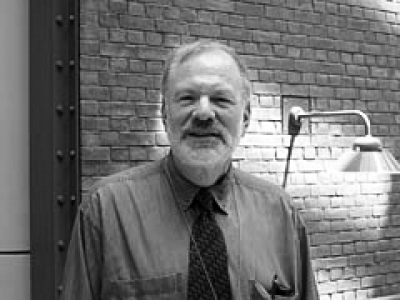Search results
1667 pages found for Yiddish club

A Yiddish Library in Search of a Home: The Yiddish Academy Library in South Africa
by ROBERTA NEWMAN
The Yiddish Academy library is looking for a new home and it needs one fast.
The 2,000-volume library is currently in a temporary storage space at Beyachad, the Jewish Community Center of Johannesburg, South Africa, but has been asked to vacate. “Many of the books are very valuable,” notes Cedric Ginsburg, a Yiddish Academy lecturer and activist. “Some were published in Vilna; some in South Africa. In fact, we have a pretty good coverage of South African Yiddish literature."
The library is only one project of the fledgling Yiddish Academy, a new organization first conceived in 2001 by translator and scholar Joseph Sherman (1934-2009) and Eli Goldstein, a businessman, who is today based in Johannesburg and Toronto. They started with Yiddish classes for a few students in 2003, and by 2006, the organization was stable enough to register as an official club.

YIVO Yiddish Romance Mug
What if you’re too modern and progressive to use a traditional Jewish matchmaker? You might have to go it alone. Such was the case for some Yiddish-speaking singles who had to rely on things like Salon-Flirt, the Tinder of the 1920s. Salon-Flirt was a popular card game in Europe and America ...

YIVO Yiddish Body Parts Mug
Get your very own Yiddish Body Parts Mug for $19.99 (includes S&H)!* The mug features Yiddish vocabulary for parts of the body and an illustration from an anatomical diagram of a skeleton found in the anatomy notebook of a student at a Tsentrale Yidishe Shul-Organizatsye school (Central Yiddish School Organization, TSYSHO). Oshmene, Poland, 1937. ...

Yiddish Theater Pack
#ohmama Get your very own Yiddish Theater Pack for $32.99 (includes S&H)!* Purchase The Yiddish Theater Pack includes: 4 Postcards featuring sheet music covers of popular songs of the Yiddish stage. 3 Buttons featuring Yiddish theatrical images of Belle Didjah, Stella Adler and the chorus girls in a Molly Picon production. 3 Magnets featuring costume ...

Genealogy Collection: Books in Hebrew & Yiddish
Pinkas Hakehillot: Encyclopedia of Jewish Communities, Rumania, Vol. II. Jerusalem: Yad Vashem, 1980. (H) Yidn in Ukrayne [Jews in the Ukraine], Vol. I. New York: Society to Eternalize the Memory of Ukrainian Jews, 1961. Yidn in Ukrayne [Jews in the Ukraine], Vol. II. New York: Society to Eternalize the Memory of Ukrainian ...

Towards a Yiddish Architecture
On February 23, 2015, Bard College professor Cecile Kuznitz broke new ground in the study of Jewish material culture with a lecture entitled “Towards a Yiddish Architecture.”
While Jews once comprised a sizable element of most East European cities, they were never the dominant culture. How did they assert their presence in the urban landscape despite their lack of political power? Professor Kuznitz’s work-in-progress looks beyond synagogues and examines institutional and residential architecture created by Yiddish-speaking Jews in Poland and their émigré communities in the United States, and explores the role of the built environment in constructing a modern Jewish culture in the Diaspora.

Facts About Yiddish in America (1965)
This episode was originally broadcast on November 7, 1965. Host Sheftl Zak provides some facts about Yiddish in America that he thinks will be of particular interest to two types of listeners: people using the textbook College Yiddish to learn the language and people who have written in to YIVO ...

An Exhibition & A Class on Yiddish Spelling (1965)
In this episode, originally broadcast on October 17, 1965, Zosa Szajkowski joins Sheftl Zak to talk about a YIVO exhibition on Yiddish orthography that was presented in conjunction with a class by Dr. Mordkhe Schaechter on the same subject. The scope of the exhibition reached as far back as the ...

Rakhmiel Peltz Appointed YIVO’s Inaugural Atran Visiting Professor of Yiddish Language and Linguistics
The YIVO Institute for Jewish Research is pleased to announce the appointment of Dr. Rakhmiel Peltz as the inaugural Atran Visiting Professor of Yiddish Language and Linguistics.
Dr. Peltz, a specialist in the social history of Yiddish language and culture, is the Founding Director of the Judaic Studies Program and Professor of Sociolinguistics at Drexel University. His numerous articles and publications include “From Immigrant to Ethnic Culture: American Yiddish Culture in South Philadelphia,” (Stanford University Press, 1997). Dr. Peltz has been a fellow at the Center for Judaic Studies of the University of Pennsylvania, the Center for Advanced Holocaust Studies of the US Holocaust Memorial Museum, and the Patt and Choseed Fellowships at YIVO. He is currently working on a book on Uriel Weinreich’s research oeuvre, as well as a book on the future of the Yiddish language.




